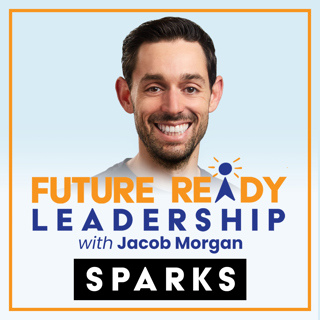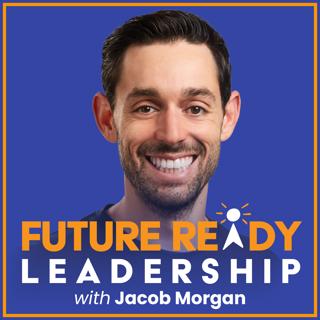
Sparks: Lead the Future: Why Current Workplace Models and Mindsets are Outdated and How to Change Them
The way we manage people today is built on ideas from over 100 years ago—ideas designed for factory floors, not modern workplaces. Management was originally created to enforce control, standardize behavior, and ensure compliance. Engagement, empowerment, and innovation? None of those were part of the equation. And yet, many organizations still operate with that outdated playbook, whether they admit it or not. In today’s Leadership Spark, I break down how the roots of management are still shaping the way we lead today, and why that must change. From the rigid philosophies of Frederick Taylor and Henry Fayol to the mindless “yes sir” culture revealed in David Marquet’s story as a submarine captain, we explore the dangers of blind obedience, outdated control models, and transactional leadership. You’ll also hear how even the words we use, such as manager, employee, and work still reflect an antiquated, dehumanizing view of the workplace. Things are changing, and if you want to lead the future, better start rejecting the “slave driver and cog” model now and build cultures based on trust, empowerment, and shared responsibility. ________________ Start your day with the world’s top leaders by joining thousands of others at Great Leadership on Substack. Just enter your email: https://greatleadership.substack.com/
22 Aug 10min

How to Handle Conflicts Without Losing Your Cool, Your Relationships, or Your Job
Why do we struggle with conflict even when we know it's important? In today’s polarized and high-stakes workplace, leaders are more afraid than ever to say the wrong thing or engage in tough conversations. But avoiding conflict doesn’t protect relationships, it slowly breaks them. In this episode, Bob Bordone, Senior Fellow at Harvard Law School, shares why conflict isn’t something to fear, but something to practice and turn into a tool for connection. You’ll learn how to build conflict resilience by recognizing your default conflict style (fight, flight, freeze, fawn, or fester), why avoidance is the “slow kill” of meaningful relationships, and how to approach disagreement with assertiveness and empathy. We also tackle how to know when to engage in conflict and when to let it go, handling workplace tension and generational differences, why most workplaces misunderstand psychological safety, and why grace—not censorship—is the antidote to cancel culture. This episode will show you why discomfort isn't something to run from and give you the mindset and tools to handle conflict with more clarity, confidence, and care. ________________ Start your day with the world’s top leaders by joining thousands of others at Great Leadership on Substack. Just enter your email: https://greatleadership.substack.com/
18 Aug 49min

From Drudgery to Employee Experience: Five Trends That Will Shape the Future of Work
If aliens landed on Earth and observed how we work, they’d probably be baffled. We spend most of our lives doing this thing called “work,” yet so many people feel unfulfilled, undervalued, and stuck in roles that don’t inspire them. It’s even baked into our language. Look up synonyms for “employee,” “manager,” or “work” and you’ll find words like cog, zookeeper, and drudgery. Something’s clearly broken. But the good news? It’s starting to change. In today’s Leadership Spark, I break down the five major trends reshaping how we define work: the rise of new behaviors driven by tech, generational shifts in values, globalization, increased mobility, and disruptive technologies like AI and automation. We also explore why traditional employee engagement just isn’t cutting it anymore, despite massive investment, engagement scores remain low. You’ll learn why employee experience is the real path forward. If you want to understand where the future of work is headed and what it takes to lead in it, this one’s for you. ________________ Start your day with the world’s top leaders by joining thousands of others at Great Leadership on Substack. Just enter your email: https://greatleadership.substack.com/
15 Aug 8min

Why Empathy, Trust, and Communication Are Every Leader’s Advantage in the Age of AI
Why are so many employees entering the workforce unsure of themselves, lacking confidence, and not quite ready to thrive? And with AI automating more tasks by the day, what should leaders actually be focusing on to future-proof their people? The world is flooded with information at the speed of light, yet starved of real connection and human skills. So how do we bridge the growing gap between soft skills and hard results? In this episode, Joe Hart, President and CEO of Dale Carnegie, joins us to unpack how to future-proof your workforce by re-centering on timeless human principles like empathy, trust, and communication. We explore why emotional and social intelligence, not technical expertise, will define leadership success in an AI-powered world. You’ll learn how to better understand and lead across generations by shifting from judgment to curiosity, why building confidence and connection should be at the heart of your talent strategy, and why real growth starts with personal responsibility. Plus, we dive into how leaders can prepare Gen Z to be job-ready through more confidence-building and less criticism, and how to balance high-tech tools with high-touch leadership. ________________ Start your day with the world’s top leaders by joining thousands of others at Great Leadership on Substack. Just enter your email: https://greatleadership.substack.com/
11 Aug 43min

Sparks: Want to Get and Retain Top Talent? You NEED to Watch This!
What if your employee perks are actually backfiring… making people disengage faster, not stay longer? The way we attract and retain talent is overdue for a serious reset. In today's Leadership Spark, we dive into why the traditional employer-employee relationship is broken and what leaders must change to stay relevant. You’ll learn how outdated recruitment practices no longer work in a world where candidates interview you just as much as you interview them. We also unpack why engagement initiatives like free lunches or yoga classes, aren’t fixing anything long-term, and how companies end up trapped in a cycle of quick-fix perks that fail to build a lasting connection. You’ll discover the real reason behind declining engagement scores, the hidden trap of the “hedonic treadmill,” and why the next evolution of leadership is about building genuine experiences, not selling false promises. ________________ Start your day with the world’s top leaders by joining thousands of others at Great Leadership on Substack. Just enter your email: https://greatleadership.substack.com/
8 Aug 9min

How to Stop Leading from Fear and Start Taking Radical Responsibility at Work
So much of what holds leaders back isn’t strategy or skill. It’s the invisible mindset traps we don’t even realize we’re stuck in. Most leadership challenges are created by unconscious patterns running the show beneath the surface. In this episode, we dig into what it really takes to break those patterns with Diana Chapman, executive coach and co-author of The 15 Commitments of Conscious Leadership. We explore how leaders unknowingly operate from fear instead of trust, how ego-driven patterns around control, approval, and security quietly sabotage progress, and why taking radical responsibility is a game-changer. Diana also breaks down the Drama Triangle—the victim, villain, and hero roles we slip into—and reveals how to break free from reactivity and drama to lead with more clarity and presence. We unpack why addiction to comfort and being right can quietly derail your leadership impact, and explore the dangers of greed in leadership, and what it really means to show up in a state of trust and curiosity. ________________ Start your day with the world’s top leaders by joining thousands of others at Great Leadership on Substack. Just enter your email: https://greatleadership.substack.com/
4 Aug 56min

Sparks: The Employee Experience Equation: How Physical Space, Technology, and Culture Can Make or Break Teams
What if your office is making people miserable… and you don’t even see it? We now live in a world of hybrid work. The spaces we work in, the technology we use, and the culture we experience shape us more than we realize. If you’re still only focusing on tasks and performance while ignoring the environments that make or break engagement, you’re already falling behind. In today’s Leadership Spark, we uncover the three hidden forces driving employee experience: physical space, technology, and corporate culture. You’ll hear how these environments impact mental health, motivation, and performance, and what you can do to fix the silent culture killers draining your people. This episode will also show you why corporate culture is really the side effects of working at your company, and why modern leaders must see themselves as the front line of human connection, not just task management. ________________ Start your day with the world’s top leaders by joining thousands of others at Great Leadership on Substack. Just enter your email: https://greatleadership.substack.com/
1 Aug 14min

The Leadership Mindset You Need in an AI-Driven World
AI is moving faster than any of us can keep up. Every week brings a new tool, every month a new disruption, and leaders everywhere are left scrambling to understand what this means for their people, their culture, and their future. In this episode, I sit down with Charlotte Eaton, Chief People Officer at Arm—the company powering almost every smartphone on the planet—to explore how AI is fundamentally transforming the workplace. We discuss the skyrocketing demand for AI talent, how companies like Arm are rolling out AI tools across their workforce, and the growing pressure on leaders to stay ahead of rapid technological shifts. Charlotte shares insights on building an AI-ready culture, the risks of outsourcing human thinking to machines, and how leadership mindsets must evolve to thrive in this new era. We also explore the future of work, from the rise of AI co-pilots and system-based thinking to changing views on education, hiring, and organizational design. If you’re struggling to make sense of AI’s rapid takeover, this episode is for you. ________________ Start your day with the world’s top leaders by joining thousands of others at Great Leadership on Substack. Just enter your email: https://greatleadership.substack.com/
28 Juli 55min






















